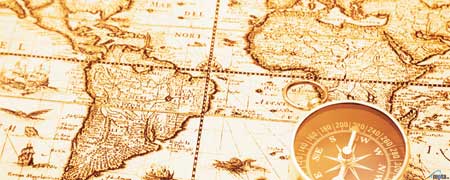Compass and the cardinal directions
Compass - the gadget people used for navigation when more precision was needed than provided by the stars, and there wasn’t any GPS yet. You might not feel the need of a compass when traveling inside a city today, but in environments like desert or sea, where everything around you looks so similar that you cannot even tell the way you took to reach where you are, compasses were real life savers. With the help of a compass, you can identify and follow one direction without unnecessary deviation, unless there is a “Free Pizza” sign out there somewhere in the boondock. Oh wait, did someone say One Direction? That would be me. Ah, things I do to make you guys read history!
The Chinese were the first to discover the earth’s magnetic field and they took some practical advantage out of it by using a magnet to tell directions. By the fourth century BC, they had a fully functional compass which they called a Sinan. The Chinese word “Sinan” means ‘commanding the self’. In addition to helping the Chinese find their way, the Sinan was also a symbol for wisdom in Ancient China, since it also helped the kings to steer the country to the right direction - figuratively, perhaps.
By the 13th Century, the magnetic compass was being used in Europe, Abbasid caliphate, Africa and India. The English word “compass” comes from the Latin compassare which means to pace out. In Latin, the prefix com was used to mean “together” and passus meant “a step”. The English word “pace” comes from the same root.
The directions a compass helps us know have not always been called north, south, east and west. In the times when the people spoke Proto-Indo-European language, there was a word ner that meant “down”. It developed into old German as nord and the English called it “North”. But in maps, North is always on the top, then how come the word for “down” end up meaning “north”? Maybe the early Indo-Europeans saw the world upside down. Who knows!
“South” also comes from Proto-Indo-European (PIE) word sunpaz, and old English took it as sup (definitely not in the sense of “what’s up” though). The English word “sun” might also have come from the same root as “south”. Looks like some brilliant PIE sage had revealed “lo I see a big yellow ball emerging from the ground in front of me, so let’s just name the direction at my right after it!”
The word “East” derives from PIE word aus which meant ‘to shine’ or simply ‘dawn’. It makes sense to name the side from where dawn breaks, after the word for dawn. In PIE, the word wespero was used for “evening”, which was shortened to wes only. “West” comes from the same root, and so does the Latin word vesper (evening).
The compass might be an outdated device to use today, since the geostationary satellites are there to help us find our way. But it is due to the inventions, like compass, that we were able to progress and make such technological advancements. No matter how much we evolve from here, we shall always be thankful to the gadget that showed us the way to where we are now.